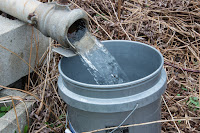Breasts are glands.
That means that they are not, say, fence posts or buckets, nor even bladders.
Do many people know what glands do? Here's a simple overview: through interaction with the blood system, glands absorb blood components and create enzymes and hormones and a variety of complex fluids and then excrete what is created. We have salivary glands, men have seminal glands, we all have adrenal glands. They excrete things: saliva, semen, adrenaline... or, in the case of mammary glands: milk.
Do many people know what glands do? Here's a simple overview: through interaction with the blood system, glands absorb blood components and create enzymes and hormones and a variety of complex fluids and then excrete what is created. We have salivary glands, men have seminal glands, we all have adrenal glands. They excrete things: saliva, semen, adrenaline... or, in the case of mammary glands: milk.
When you think of eating, do you say to yourself 'better wait for my salivary glands to fill up, so I'll be able to chew and swallow....' Hardly. Glands don't 'fill up' they 'produce.' So, just for real, blatant clarity: breasts produce milk, they don't store it.
Since they don't 'fill up' it is also not possible for them to 'empty.' If one more healthcare professional says 'empty the breast' within 100 yards of me, I am going to scream. What century, do you think it was, when it was 'discovered' that breasts were glands? Who, out of a random sample of professions that includes lawyers, research librarians, potters and physicians, do you think should know that?
 Like pineal glands and pituitary glands and sweat glands, mammary glands don't have an expiry date. That means that whenever those glands are triggered to start doing what it is that they do, they don't magically stop being able to do so at some arbitrary point in time. So, cue the screaming: the next time I hear a healthcare professional tell anyone that after X years or months mothers can no longer make 'good' milk, I'm just going to go completely banshee.
Like pineal glands and pituitary glands and sweat glands, mammary glands don't have an expiry date. That means that whenever those glands are triggered to start doing what it is that they do, they don't magically stop being able to do so at some arbitrary point in time. So, cue the screaming: the next time I hear a healthcare professional tell anyone that after X years or months mothers can no longer make 'good' milk, I'm just going to go completely banshee.
The changes that occur in breasts during pregnancy alter the function of the breast forever. From being a cute way to fill out a bra they become functioning glands. They do not revert to non-functioning glands, although their production without the necessary stimulation will reduce to virtually nil. So, whether or not this mommy is currently making any milk for anyone doesn't stop the gland from being fully capable of functioning at any time. It may take a while for the necessary stimulation to create a significant supply again, but demand (or the lack of it) is the only reason for the supply to diminish. Women who are decades post-menopause can continue to lactate.
 Which brings me to the next one: 'lost my milk'. Grrr. Shall I just scream now and save myself the suspense in waiting?
Which brings me to the next one: 'lost my milk'. Grrr. Shall I just scream now and save myself the suspense in waiting?
It is not possible to 'lose' milk. Well, after you've expressed it into something, you can certainly lose track of it... but 'I couldn't make any milk' is so incredibly rare a physical condition to be statistically-irrelevant for this diatribe. No matter what makes anyone feel less guilty about their choices, sorry to say.
[At this juncture I will just interrupt myself to point out that I happen to know there are a great many vile and unhealthy choices that rival even artificial breastmilk formula in terms of damage to baby's health and potential for loss of life that a great many children have survived being fed in infancy. I know that for many women breastfeeding is a tremendous struggle and for many more it is just about the most gross and disgusting thing they can think of doing with their bodies (which makes me wonder how they felt about the process of getting pregnant.... but, hey! whatever!). But, honestly, it would be so much less obnoxious if they just said 'I just didn't want to,' instead of repeating all the physically-impossible fantasies about how they 'couldn't.' If they can't deal with how guilty they feel about not wanting to (or about caving into the pressure not to, or by being ignorant enough of the facts to be convinced by someone that it was impossible, or didn't matter much anyhow), I am certainly not going to go to any trouble to cover up the accurate information -- first because it won't help them and, second because lying to another woman certainly won't make anyone's else's guilt go away, either. Get therapy, and leave the breastfeeding advocates out of it, k?]
Just as no one measures the amount of saliva output when they're not eating (and then fret about how little saliva they make, oh my!) the measure of 'enough' breastmilk is based solely on the baby having unlimited access to the breast and being well-positioned to be able to do the job.
Yes, I did say 'unlimited'.
Breasts need babies around to stimulate an appropriate milk supply (oh, what a surprise), and babies need breasts around to grow naturally and normally. Isn't it fortunate how breasts and babies tend to come all of a piece...
When mom decides that baby can be 'over there' (in another room or city), she is gambling on her body's ability to respond to stimulus that is not present. Lots of women have those kind of breasts: make buckets of milk at the drop of a pin, pretty much no matter what is going on around them.
Other women are less fortunate (and have drier clothes): they need the baby right there, hormones and all, for their bodies to respond to the stimuli necessary. Including [is everyone ready to shudder and shriek?] licking, bumping against and mouthing without sucking 'purposefully'.
Yes, that means that a baby with unlimited access to the breast is not going to be nursing 'down to business' 100% of the time. Restricted from the rest of the natural behaviours that increase milk supply, this mom is going to have a great deal of difficulty making her body do what would otherwise be natural. Pump or no pump. Period. No matter how uncomfortable it makes anyone else.
Breastfeeding, lactation and the function of the human breast are biological processes.
Pretending that the social 'norms' or cultural discomforts are important is naive to say the least. Cultural lies actively impede healthy breastfeeding.
Pretending that the social 'norms' or cultural discomforts are important is naive to say the least. Cultural lies actively impede healthy breastfeeding.






